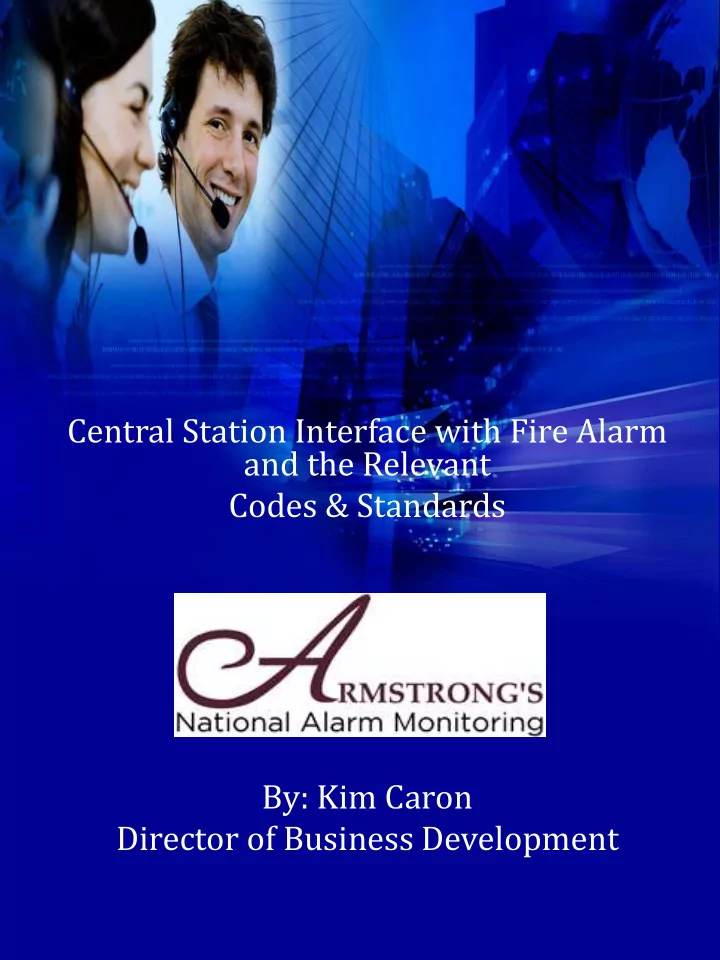

Central Station Interface with Fire Alarm and the Relevant Codes & Standards By: Kim Caron Director of Business Development
Communication Paths History Panel Testing Requirements ULC Listed Station requirements ULC S561 Station Requirements Cellular Phone Apps
POTS: Plain old telephone line GSM: cellular IP: Internet Protocol
Panel connection from the fire alarm panel Contact ID and SIA are standard transmission protocol Mediums : POTS, IP and GSM Dual path required
History POTS have been used for monitoring with the majority monitored fire alarm systems across Canada. Dual path POTS. Was designed to have a back up should one line fail. GSM - Cellular Network Advancement of technology allows signal transmission via cellular network. Most manufactures use the Rogers Network. Coverage throughout Canada is increasing. Can be weak in areas. VERY Important to ensure a strong signal strength at time of installation to eliminate future problems.
IP – Internet Protocol Needs to be used in combination with another medium. Not reliable to be used as only communication path. Internet connection not always stable and does drop from time to time, depending on the carrier. Back up power supply required to assist during power fails.
ULC accepts any of the following combinations: POTS (dual path, grandfathered) POTS / IP POTS / GSM IP / GSM GSM Supervised (polled every 90 seconds by station received and 180 seconds by Fire Panel) Above may vary depending on panel manufacture
Codes Fire Alarm, Fire Trouble, Supervisory, AC Fail, Low Battery Alarm transmission codes are programmed in the Fire Panel by the installing company. Panel sends the codes directly to the dialer which transmits to the Central Station. Exception one communicator has 4 codes preprogrammed. At time of Installation the installing company MUST test all programmed codes and provide descriptions to the central station.
Each panel manufacture does things a little different and the installing company should be trained by the manufacture prior to installing.
Process may vary slightly from station to station. Installer calls station prior to install Gives account number, along with pertain information such as panel type, medium, and time line to have account in “Test”. Installer needs to ensure the test all codes that will be set to the station on each path of communication. Once completed all signals need to be verified with the station and full descriptions are required for all code.
Communication to the station is very important. We are very good at the service we provide However we are not mind readers Never assume we know what each supervisory or trouble indicates. Nothing worse than telling a customer or Dealer a trouble reported without an explanation to back it up.
Ensure the Cellular communicator is showing a “Strong” signal strength Ensure the zone tripped is sending the correct code identifier Ensure IP supplier offers a good service. Otherwise it can cause customer and installing company frustration on high volume signal transmissions from communication and AC failures.
All ULC Fire listed Central Stations are inspected annually. At a high level ULC listed stations are required to have the following: Complete redundancy Signal Receivers Servers Operator Terminals Mantrap 2 hour rated Fire protection Outdoor/indoor cameras Voice recordings Disaster Recovery Data storage Complete Power back up UPS / Generator
Canadian Building code has adhere to ULC S561 Stations must: Fire Alarms: must complete fire dispatch within 30 seconds of station receiving the signal. Notify customer within 5 minutes of receiving a Trouble signal Fire Alarms are required to be reset within 8 hours. Fire Trouble/ Supervisor signals must be restored within 12 hours from receipt of signal. If a restore is not received from station another notification will be made. If no reset received by station another notification needs to occur. Important for dealer to train on site staff on how to reset panel.
Since 97% of the worlds population has a cellular phone Of that 97%...98% of these people never have their phone more than two feet away from them at all times. Naturally is made sense to create an app to assist the dealer.
When entering Data into the Account Search, the system will search Account Number field Address Field Account Name Field So, if you put in “main” for example, it would produce all your accounts in a list, that have “main” in the name, like Main District Office, and it would produce all accounts on “Main” Street as well. Then you can easily scroll and pick the one you want to work with.
Questions? Thank you. Kim Caron Director Business Development Armstrong’s National Alarm Monitoring 1-866-201-0551 kim@armcom.ca www.armcom.ca
Recommend
More recommend